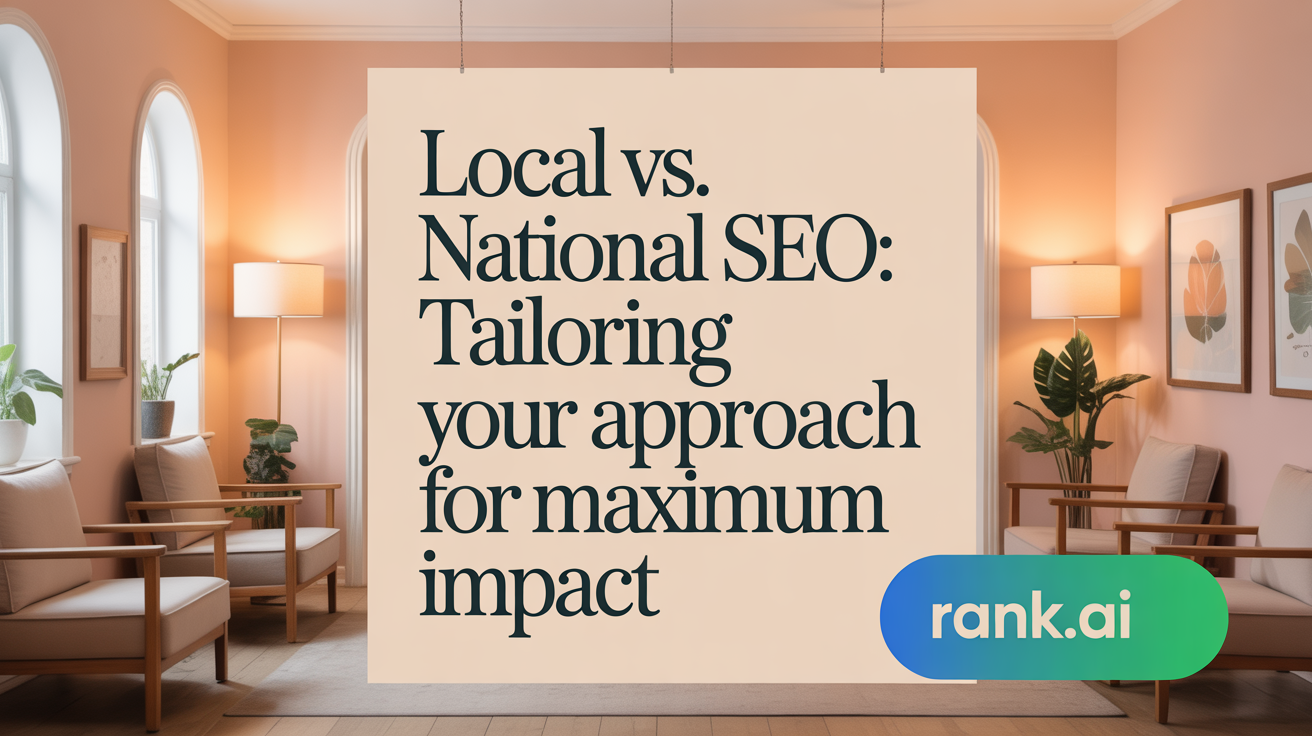Introduction to SEO and Its Importance
Search Engine Optimization (SEO) is a critical digital marketing practice aimed at enhancing a website's visibility and ranking on search engine results pages (SERPs). By optimizing various aspects such as content quality, website structure, technical performance, and backlink profiles, SEO helps businesses attract organic, non-paid traffic. In today's digital landscape, understanding the nuances between local SEO and national SEO is essential for businesses to reach their target audiences effectively and achieve their growth objectives. This article explores the key differences, strategies, audiences, content approaches, benefits, and use cases of local SEO versus national SEO to help businesses make informed decisions.
What is SEO and Why Does It Matter?

What is SEO?
Search Engine Optimization (SEO) is the process of improving a website's visibility on search engine results pages (SERPs). The goal is to attract more organic, or non-paid, traffic by making the site more appealing and relevant to search engines like Google and Bing.
How SEO improves website visibility
By optimizing key website elements, SEO helps your site appear higher in search rankings, making it more likely that users find and visit your pages. Higher rankings typically lead to increased traffic, brand awareness, and potential conversions.
Technical and content elements of SEO
Effective SEO involves multiple components. Technical aspects include ensuring fast loading times, mobile-friendliness, and secure site architecture. Content-related strategies focus on creating high-quality, relevant content that matches the interests and queries of your target audience. Building reputable backlinks further boosts your site's authority.
Ongoing nature of SEO
SEO is not a one-time effort but an ongoing process. Search engines frequently update their algorithms, and user preferences evolve over time. Continually refining your SEO tactics ensures your website remains competitive, discovers new opportunities, and maintains its search engine ranking.
How does SEO work?
SEO works by aligning your website's structure, content, and authority with the criteria used by search engines to rank pages. Techniques such as keyword optimization, backlink building, and technical improvements help the search engine algorithms understand and prioritize your website for relevant searches. When combined, these efforts help your site attain organic visibility, attract targeted visitors, and foster long-term growth.
Core Differences Between Local SEO and National SEO

What is the difference between local SEO and national SEO?
Local SEO is designed to optimize a business’s online presence to ensure it appears prominently in local search results, such as the popular Google local pack or map pack. This involves targeting geo-specific keywords, creating location-specific content, and leveraging local citations. Business owners focus on acquiring backlinks from nearby directories, managing customer reviews, and highlighting landmarks or community events to draw local customers.
In contrast, national SEO aims for broader visibility across entire countries, targeting general keywords that attract a nationwide or even global audience. It focuses on creating high-quality, relevant content, building backlinks from authoritative sources, and optimizing technical aspects of the website.
The strategies differ notably in their approach to content, link-building, and reputation management. Local SEO emphasizes community engagement, proximity, and immediate relevance, while national SEO concentrates on increasing overall domain authority and broad search rankings.
Choosing between local or national SEO depends heavily on the business’s goals and target audience. Local SEO is ideal for businesses serving nearby customers who need quick, location-specific solutions. Conversely, national SEO suits companies aiming to expand their reach across wider markets or online-only enterprises.
Both strategies have distinct advantages and challenges. Local SEO tends to be more cost-effective and less competitive but can be slower in producing results. National SEO involves higher resource investment and faces more intense competition but offers greater exposure.
Ultimately, understanding the difference helps businesses tailor their marketing efforts effectively, whether focusing on community-based growth or broader recognition.
Target Audiences and Keyword Strategies for Local and National SEO

What are the target audiences and keyword focuses for local SEO versus national SEO?
Local SEO primarily targets consumers who are physically nearby and looking for specific products or services in a defined geographic area. These include walk-in customers or locals seeking nearby restaurants, dentists, or retail stores. The main goal is to attract foot traffic and strengthen community presence. To achieve this, businesses optimize for location-specific keywords like "pizza restaurant in Downtown" or "plumber near me." They also focus on local information, such as managing Google My Business profiles, maintaining consistent business NAP (Name, Address, Phone number), and building citations on regional directories.
In contrast, national SEO aims at reaching a broader audience across an entire country or large region. The target visitors are often online consumers interested in products or services that can be purchased remotely or are available nationwide. The keyword strategies include high-volume, broad keywords like "buy running shoes" or "best online gym equipment." These keywords don't include specific locations but focus on terms with a wide appeal. Strategies involve creating high-quality content, improving website authority through backlinks, and optimizing technical SEO to compete in a highly competitive environment.
Many businesses find value in adopting a hybrid approach, blending local and national SEO tactics. This allows them to dominate their local markets while also expanding their wider online footprint, capturing both nearby consumers and broad audiences.
Distinct Strategies and Techniques in Local vs National SEO

What strategies and techniques are used differently in local SEO compared to national SEO?
Local SEO and national SEO each employ distinct strategies tailored to their objectives. Local SEO focuses on making businesses visible in specific geographic areas. It involves optimizing Google My Business listings by claiming, verifying, and enriching profiles with accurate information, photos, and reviews. Creating location-specific content about local events, landmarks, and services helps attract nearby customers.
Another critical component is managing local citations—mentions of the business name, address, and phone number (NAP)—across trusted directories like Yelp, Yellow Pages, and local chamber of commerce sites. Using geo-modified keywords such as "near me," "in Charlotte," or "city + service" ensures visibility in local search results and the Google local pack, which displays the top three relevant businesses in map format.
Link building in local SEO emphasizes acquiring backlinks from local sources—regional websites, community blogs, and local news outlets—to increase local relevance and authority. Encouraging and responding to customer reviews on platforms like Google My Business and Yelp also impacts local search rankings.
Conversely, national SEO aims at higher broad-competition keywords with a wider audience. Its strategies include comprehensive keyword research to identify high-volume, non-geographic keywords. Creating high-quality, relevant content—such as blog posts, industry guides, and videos—serves to inform and engage a larger audience. Optimizing on-page elements like meta tags, headers, and URLs enhances visibility for broader search queries.
Backlink building in national SEO targets reputable high-authority sites within the industry or related sectors. Securing backlinks from these sources boosts overall domain authority, improving rankings across many keywords. Technical SEO, including website speed, mobile responsiveness, and secure infrastructure, is also more extensive to support broad visibility.
On-page and technical SEO differences
Local SEO emphasizes local keyword usage in titles, meta descriptions, and content, along with schema markup for local data, and embedding Google Maps on the site. It ensures consistency of NAP details across all listings. Technical aspects include ensuring mobile-friendliness and fast loading times. These measures help improve relevance in local search results and the local pack.
National SEO employs broader on-page optimization with location-specific landing pages or subfolders for regional targeting. Its technical focus includes site architecture improvements for better crawlability, faster load times, and schema markup for general content. It aims at covering a wide geographic scope without specific focus on proximity.
Importance of link building from local vs high-authority industry sites
Local SEO benefits greatly from backlinks from local business directories, community sites, and regional publications. These links help establish local relevance and trustworthiness, influencing local search rankings.
In contrast, national SEO relies on earning backlinks from high-authority industry blogs, news outlets, and authoritative websites. These backlinks enhance overall domain authority and improve search rankings for a broad array of keywords.
Both strategies are vital; however, their focus underscores the primary goal—local relevance versus broad authority—making their integration an effective approach depending on business needs.
Content and Messaging Differences Between Local and National SEO
How do content and messaging differ between local SEO and national SEO?
In local SEO, the focus is on creating content that resonates with a specific geographic community. This includes highlighting local events, landmarks, or community partnerships to foster a sense of relevance and trust among nearby customers. Geo-specific keywords like "Seattle plumber" or "Delhi yoga studio" are crucial, as they improve visibility in local search results and attract nearby prospects.
Local SEO content often incorporates community engagement elements—such as customer reviews, testimonials, and collaborations with local directories or organizations—to build a strong local reputation. Including schema markup for local business details and embedding Google Maps enhances the search engine's understanding of local relevance.
Conversely, national SEO emphasizes broad, industry-focused topics that appeal to a wider audience without emphasizing specific locations. Content in this arena tends to standardize messaging around the company's expertise, products, or services, often focusing on benefits applicable across multiple regions or nationally.
The keywords chosen in national SEO are less geo-specific and more high-volume, competitive terms that aim to boost rankings across the country. Messaging here is designed to establish authority and trust on a broader level, often by providing in-depth industry insights, comprehensive guides, or broad value propositions.
While local SEO content aims to foster community connection and immediate relevance, national SEO strives for broad recognition and industry leadership. These differences influence not only what is communicated but also how it is tailored to attract the intended audiences and achieve their respective goals.
Benefits and Drawbacks of Local SEO Compared to National SEO
What are the benefits and drawbacks of local SEO compared to national SEO?
Local SEO aims to enhance visibility in specific geographic areas, predominantly targeting nearby customers who are searching for immediate solutions. One of its primary advantages is cost-effectiveness; local SEO often involves lower investment because it focuses on targeted local keywords, localized content, and building citations on regional directories. It is also relatively easier to achieve high rankings in local search results due to less competition compared to broader markets.
Additionally, local SEO can efficiently drive targeted traffic and increase foot traffic to physical locations, making it ideal for small businesses such as restaurants, service providers, and local retailers. Techniques like optimizing Google My Business profiles, managing reviews, and utilizing local keywords help businesses stand out in local search packs, including the prominent 3-pack display.
However, local SEO also has its limitations. Its scope is confined to a defined geographical area, which means it cannot reach audiences outside that region. Growth tends to be slower and could limit potential expansion for businesses seeking national or international audiences.
In contrast, national SEO targets a broader, more diverse audience across larger regions or the entire country. Its advantages include the potential for increased website traffic, higher brand awareness, and access to a larger market. Strategies such as optimizing for high-volume keywords, creating extensive, industry-specific content, and building authoritative backlinks are central to national SEO.
The downside is that national SEO usually requires a significantly higher investment in content creation, technical SEO, and link-building campaigns. Competition is intense, especially for popular keywords, which can make ranking more challenging. As a result, it’s more resource-demanding and may take longer to see tangible results.
Ultimately, the decision hinges on the business’s size, target audience, and growth goals. Small, local businesses may find the most value in local SEO, while larger companies or those seeking wider reach might prioritize national SEO. Many organizations adopt a hybrid approach, combining both strategies to maximize visibility locally and nationally, addressing diverse customer needs and expanding their market presence efficiently.
When to Choose Local SEO or National SEO: Use Cases and Business Types

In what situations or use cases should businesses adopt local SEO versus national SEO strategies?
Businesses should opt for local SEO when they have physical locations or serve customers within a specific geographic area. For example, restaurants, hair salons, plumbers, and local retail stores benefit greatly from optimizing their online presence for nearby searchers. Techniques like creating location-specific content, claiming Google My Business profiles, and earning reviews help these businesses appear prominently in local search results, including the coveted Google 3-pack.
On the other hand, companies with a broader target audience, such as e-commerce platforms, large corporations, or online service providers, should prioritize national SEO. These businesses aim to increase visibility across large regions or nationwide, often targeting high-traffic keywords that aren't tied to a specific location. The focus here is on comprehensive keyword research, high-quality content, backlink profiles, and technical website optimization to rank well in broad search queries.
Understanding the primary customer base and operational scope guides the choice of strategy. Local SEO is ideal for businesses focusing on immediate local markets, while national SEO suits those seeking to attract visitors from across the country or internationally.
Both strategies share common SEO techniques, including keyword optimization and link building, but differ in emphasis. Local SEO relies heavily on Google My Business, local citations, reviews, and local keywords, whereas national SEO concentrates on general keywords, content relevancy, and broader backlink campaigns.
Ultimately, aligning SEO efforts with business goals—whether to attract local foot traffic or build a national brand—ensures greater effectiveness and resource optimization.
Key Components and Technical Factors in Local and National SEO
What are the essential components of local SEO?
Local SEO focuses on improving a business's visibility within specific geographic areas. Key elements include optimizing the Google Business Profile by ensuring accurate business details, adding high-quality images, and managing customer reviews. Building local citations—mentions of the business on local directories, chambers of commerce, and regional websites—helps establish credibility. Consistent NAP (name, address, phone number) information across all platforms is crucial for local signal strength.
Mobile-friendliness and fast website load times are vital for both local and national SEO, but are especially important in local SEO where users search on the go. Integrating schema markup for local business data enhances search results with rich snippets, increasing click-through rates. Creating location-specific content, such as blog posts about local events or landmarks, can also boost local relevance.
What are the main aspects of national SEO?
National SEO aims at broad, often competitive keywords to reach a wider audience across regions or nationally. This involves comprehensive keyword research to identify high-volume, relevant terms. On-page optimization includes crafting high-quality, relevant content, using optimized meta titles and descriptions, and creating dedicated pages for different regions if applicable.
A strong backlink profile from authoritative websites significantly influences domain authority and rankings. Technical SEO improvements—such as site speed, crawlability, and secure connections—are essential for maintaining good search engine rankings.
How do on-page SEO tactics differ for local versus national SEO?
In local SEO, on-page tactics include embedding schema markup specific to locations, such as LocalBusiness schema, and incorporating geo-modified keywords like "near me" or "in [city]." Content often highlights local events or landmarks.
National SEO, on the other hand, relies on broader keywords without geographic modifiers. On-site SEO focuses on creating general content applicable to a broader audience, using location pages or subfolders for regional targeting.
How do Google algorithms influence local and national relevance?
Google algorithms consider proximity, relevance, and prominence for local searches, prioritizing businesses physically near the searcher. For national searches, factors such as domain authority, backlink quality, and on-page content relevance are more prominent.
Local search results often feature the Google 3-pack, a map and list of top three local businesses, heavily influenced by Google Business Profile optimization. Both strategies require understanding these algorithmic factors to effectively improve visibility.
Integrating Local and National SEO for Maximum Online Impact
Benefits of a hybrid SEO approach
Combining local and national SEO strategies allows businesses to maximize their online visibility. Local SEO helps attract nearby customers and enhances foot traffic, especially for small businesses like restaurants and service providers. Meanwhile, national SEO expands reach, targeting broader audiences through high-quality content and backlinking. This dual approach can bolster brand awareness and sales across both local and wider markets.
How local keywords and content can enhance national SEO performance
Using localized keywords in your content, such as city or region names, boosts your chances of appearing in local search results. Incorporating local landmarks or events into blog posts makes your content more relevant to nearby users. This not only improves local rankings but can also support national SEO by creating authoritative, region-specific content that appeals to both local and broader audiences.
Leveraging local backlinks and reviews alongside national authority building
Building backlinks from local directories, community websites, and regional news outlets strengthens your local presence. Positive reviews on platforms like Google My Business also signal credibility to search engines, helping your business rank higher in local searches. When combined with national backlinks from industry influencers and high-authority sites, these tactics create a robust, diverse backlink profile that benefits overall SEO performance.
Strategic planning to align both SEO types with business goals
A well-rounded SEO plan aligns local and national efforts with your business objectives. For instance, a restaurant might focus on local keywords and reviews to attract nearby customers, while simultaneously developing broad content to improve overall brand recognition. Ensuring consistency in branding, messaging, and NAP information across all platforms ensures a unified presence that leverages the strengths of both strategies.
| Strategy Aspect | Focus Area | Typical Tactics | Best For |
|---|---|---|---|
| Local SEO | Geographically targeted | Google My Business, local keywords, reviews, local backlinks | Small businesses seeking nearby customers |
| National SEO | Broader audience | High-quality content, backlinks from major sites, technical SEO | Brands aiming for wide reach |
| Combined Approach | Both local and broad | Content, citations, reviews, backlinks, strategic content | Businesses with diverse target markets |
Integrating these strategies thoughtfully can significantly boost online visibility, driving both local sales and national recognition.
Choosing the Right SEO Strategy for Your Business
Selecting between local SEO and national SEO is a strategic decision that hinges on your business’s goals, target audience, and operational scope. Local SEO excels in helping businesses connect with nearby customers through geographic targeting, Google Business Profile optimization, and localized content, proving indispensable for small and regional businesses. National SEO, with its focus on broad keywords, authoritative content, and extensive backlink profiles, suits companies aiming for nationwide or even international reach. Often, businesses benefit from blending both approaches, leveraging local relevance and broad industry authority to maximize visibility. Understanding each approach's unique techniques, benefits, and challenges empowers businesses to tailor SEO strategies that drive meaningful online traffic and sustainable growth.
References
- Local SEO Vs National SEO: How To Choose The Right Strategy
- Local SEO vs. National SEO vs. Global SEO: A Strategy Guide
- SEO vs. Local SEO: Spilling the Tea on Must-Know Differences
- Local SEO vs. SEO: Navigating the Differences for Your Business
- Blog : Local SEO vs National SEO - 360 PSG
- Local SEO vs. Traditional SEO: What's the Difference?
- Local SEO vs national SEO and the Differences in Strategy
- Local SEO vs. National SEO | The Biggest Differences | Coalition



